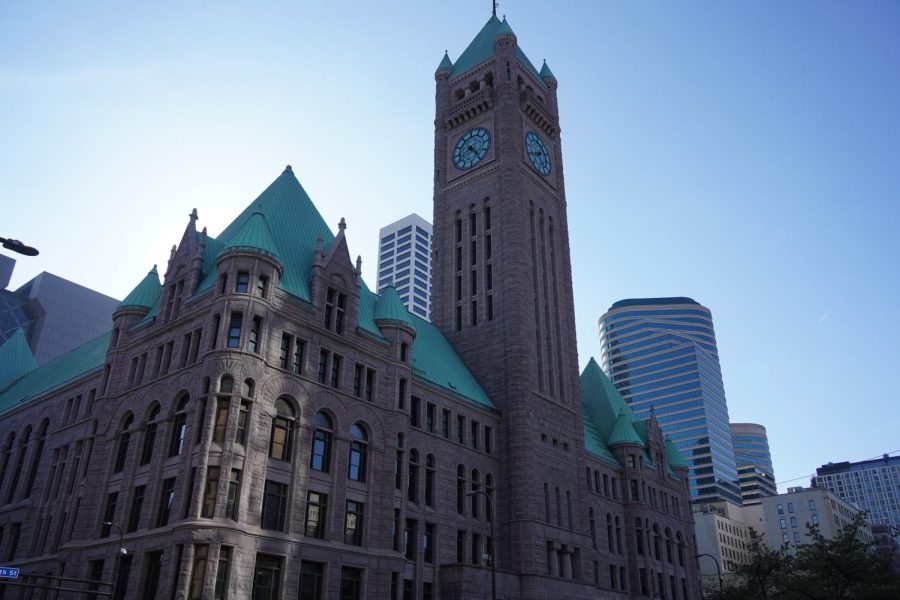Every seat on the Minneapolis City Council is up for grabs as candidates and voters prepare for the Nov. 7 election.
While council members generally serve four-year terms, this election will take place just two years after the last one due to new districts being drawn in 2021. Although the power of the council was weakened under the new strong-mayor system, which shifted the council to being a legislative entity and gave more power to the mayor, the council still has a large impact on the city budget, initiatives and ordinances.
Ward 1 incumbent council member Elliot Payne said winners of the city council elections will tackle how much power council members have under the new strong-mayor system.
“We really need to build out a robust legislative function now that we have the new government structure,” Payne said. “I think that’s been lacking since the new government structure.”
The last day for candidates to file for a run at city council was Aug. 15, so no new candidates will enter the race. Residents can vote in person or by mail as soon as Sept. 22 for early voting.
Kathryn Pearson, a professor specializing in American politics at the University of Minnesota, said candidates will need to convince constituents to both support them and come out to vote on election day.
“Voters will not come to the polls to vote for a big-ticket race like the president or the governor,” Pearson said. “It will really be up to the candidates to persuade voters to not only support them but to actually turn out.”
Many of the candidates running said their top issues for this election are police accountability, rent control and affordable housing.
Pearson said voters will use this election to decide whether they are happy with their representative or if they want someone new. Incumbents are running for reelection in all wards except Wards 7 and 12.
“[The elections] will really come down to, do voters want to return the incumbent or do voters want different policy positions and agendas coming from their city council member,” Pearson said.
Ward 1: Elliot Payne v. Edwin Fruit
Payne has represented parts of Como and North Minneapolis since his election in 2021. Previously, Payne had worked as a business analyst after graduating with a master’s degree from the University of Minnesota in 2010.
Running under the Socialist Workers Party (SWP), Edwin Fruit would be the only council member from the party if elected.
Before this election, Fruit had written for The Militant, a socialist weekly newspaper associated with the SWP, since 2018.
Ward 2: Robin Wonsley
Ward 2 takes up all of the University’s Minneapolis campus and portions of Como, Prospect Park, Cedar-Riverside, Seward, Longfellow and Cooper neighborhoods.
Robin Wonsley has represented the University of Minnesota since 2021 when she won by 13 votes as a democratic socialist.
Wonsley will run unopposed this November.
Ward 3: Michael Rainville v. Marcus Mills
Covering areas like Marcy-Holmes, Sheridan and St. Anthony West, Michael Rainville aims to win his second term in Ward 3.
Prior to being elected, Rainville worked in the hospitality industry. Rainville was also involved in the St. Anthony West Neighborhood Organization and helped fund the “Cops on Bikes” program in 1989.
Marcus Mills was involved with the Marcy-Holmes Neighborhood Association, Minneapolis’s Clean Energy Vision Advisory Committee and other Minneapolis-based community groups.
Ward 6: Jamal Osman v. Tiger Worku v. Kayseh Magan v. Guy Gaskin
Cedar-Riverside, Seward and other districts are all represented by Ward 6. Jamal Osman won his last two elections and is running for a third term.
The DFL endorsement convention for Ward 6 was controversial, as Kayseh Magan became suspicious when 178 of the 180 delegates who listed emails through the email service Proton supported Tiger Worku. Magan said he contacted many of these delegates who said they had never used Proton.
Worku said in a delegate selection meeting on March 22 Proton is an email service that is “accessible to those who otherwise wouldn’t use [email]” and said he could provide statements proving his delegates were legitimate.
Ultimately, no candidate ended up winning the DFL nomination.
Osman faces a stiff reelection campaign as he faces controversies like resurfacing homophobic and anti-Semitic Facebook posts of his from 2011 to 2013 and accusations of fraud against the nonprofit founded by his wife, according to reporting from the Minnesota Reformer.
Magan worked as an investigator for the Minnesota Attorney General’s Office and was a commissioner on the Minneapolis Commission on Civil Rights in 2019. Magan said tenant rights, public safety, police accountability and affordable housing are his top priorities.
Worku is the only candidate to live his whole life in Ward 6. Worku previously was the President of the Seward Neighborhood Group.
“I'd like for us to have an independent voice at city hall,” Worku said. “I'd like someone to center the voices of everybody in our ward rather than rubber stamping whatever people force on them.”
Guy Gaskin is one of only four candidates running as a Republican for city council. Angela Williams of Ward 4, Bob Sullentrop of Ward 8 and Bob “Again” Carney Jr. of Ward 13 are the other Republicans.
Ward 8: Andrea Jenkins v. Soren Stevenson v. Terry White v. Bob Sullentrop
Minneapolis City Council President Andrea Jenkins faces a difficult reelection campaign, similar to Osman. Despite being the incumbent, Jenkins lost the DFL nomination to Soren Stevenson.
Jenkins’ challengers include:
- Stevenson, who lost his eye when an officer shot him with a rubber bullet while protesting during the 2020 protests following George Floyd’s murder
- Terry White, who worked in the health insurance industry for more than 15 years
- Sullentrop, who was a civil engineer and is running on a pro-police platform
Correction: The original version of the article misstated which office Magan worked for. They worked for the Minnesota Attorney General’s Office.








